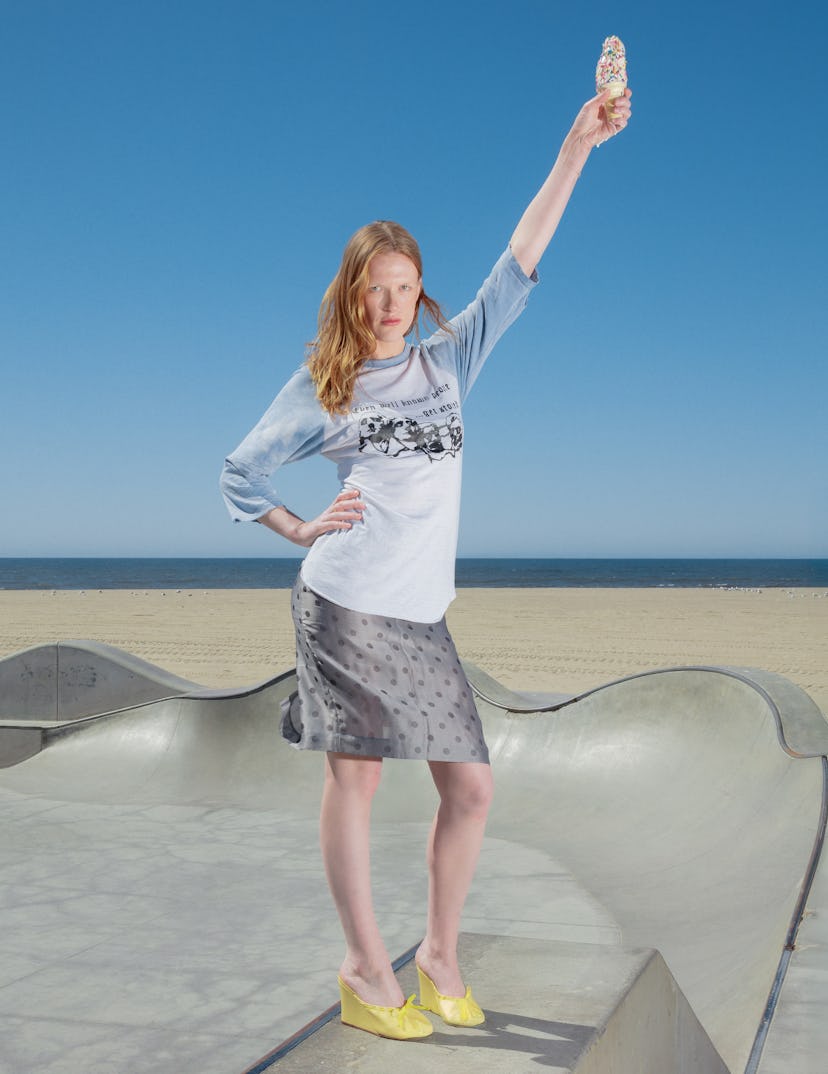Welcome to Audrey Hobert’s One-Woman Show
The “Sue Me” singer got her start writing for best friend Gracie Abrams. Then she found her own voice.

When Audrey Hobert started writing songs, she didn't intend to become a pop star. The 26-year-old began making music on a whim with her childhood best friend, Gracie Abrams. The two had “unofficially” lived together during Hobert’s sophomore year at NYU’s Tisch School of the Arts, sharing a full-size bed in a tiny studio apartment. They had so much fun that they became roommates again when they both moved back home to L.A., where Hobert got a job in television. “I didn’t think it could be more fun to hang out with her,” Hobert tells W one rainy June morning at the Russian Tea Room in Manhattan. “And then we started writing songs together.”
Abrams, whose star was already on the rise following the success of her 2023 debut album, Good Riddance, enlisted Hobert to work with her and Aaron Dessner (a frequent Taylor Swift collaborator) on her sophomore album, The Story of Us. Hobert ended up writing and singing on several songs, including “That’s So True,” the album’s biggest hit. “It feels like it was thrust upon me,” says Hobert, “that someone in the sky pointed at me and picked me up by my collar and was like, ‘You have to do this.’”
Hobert was signed as a songwriter in early 2024, but she quickly realized writing for other people didn’t suit her. “Most sessions are like: meet an artist that day, write a song for them. It didn’t feel natural to me.” So, instead, she wrote alone, spending hours plucking her guitar, sculpting stories line by line. The result is Who’s the Clown?, her debut album, due August 15 via RCA Records.
Sipping black coffee with Hobert, it’s hard not to feel infused with her optimistic energy. Wearing a pop of maroon lipstick, Hobert lights up when talking about performing her own music for the very first time later that night at The Slipper Room. The next day, fans posted videos of Hobert’s stripped-down acoustic set on TikTok. While Hobert does her best to limit her social media scrolling (“I would just rather be out in the world and in my own head than on the phone”), she feels “shook about people immediately caring” about her music.
At the time of our interview, Hobert only had one song out: the instantly viral breakup ballad “Sue Me.” Her following singles, “Bowling Alley” and “Wet Hair,” make it clear that Hobert already has a winning formula down pat. Her music blends diaristic honesty with a “concern [for] catchiness.” Of “Sue Me,” she recalls blurting out the line that would become its earworm chorus—“Sue me, I want to be wanted”—while venting to her producer, Ricky Gourmet. “It just came out. I sang it right away, and that was it.”
Working with Gourmet, a producer more known for indie and band-forward music than Top 40 polish, was another instinctive choice. “He doesn’t listen to pop, I’m 100% pop, and I think that makes for a cool sound,” she says. Together, they’ve crafted an album that feels distinctly hers. After all, it was written entirely by Hobert in eight months.
“Every song felt urgent,” she says. “I wasn’t bored for a single second [while writing].” The album’s title and its surreal cover—Hobert smiling at the camera with a terrifying clown looming in a window behind her—came to her in a flash after finishing the track “Sex in the City.” “I knew as a new artist, you have to grab people’s attention,” she says. “And I feel like the most powerful way to do that is to scare them.”
Hobert also directs and edits her own music videos, sometimes pulling all-nighters to cut them together in Adobe Premiere. “I had never edited before. I just bought a desktop and figured it out,” she says of the “Sue Me” video, in which she dances in a frenetic, gracefully goofy manner. To shoot the music video, she danced almost nonstop for eight hours, without help from a choreographer. “Forty minutes of footage were unusable, but five were pitch-perfect.”
“I was writing a one-woman show before I started writing songs,” says Hobert. “And I still feel like I’m doing that, it just happens to be an album.” Even the album’s construction mimics theater: Hobert outlines her lyrics like monologues, editing them for clarity and rhythm until the story and melody lock into place. “Every single song is me using my degree,” she laughs. “It’s all dramatic writing. It’s all storytelling.”
Like any earnest writer, Hobert hopes to make art that helps someone get through their day. “I’m not in this for anything other than to hopefully touch the lives of people of all ages,” she says. “To make people feel seen and heard by telling the truth of my life. For a little girl in Kansas to go, I can go to school tomorrow, because this song that Audrey wrote makes me feel like I'm beautiful, even though I have raging hormonal acne and don't like myself. But Audrey likes herself even though she's dealt with all those things. It's the only thing I want.”